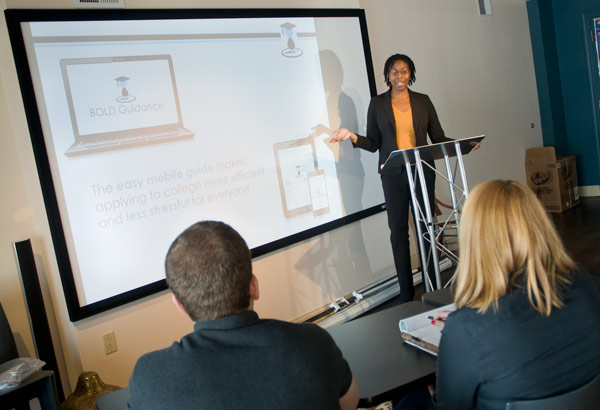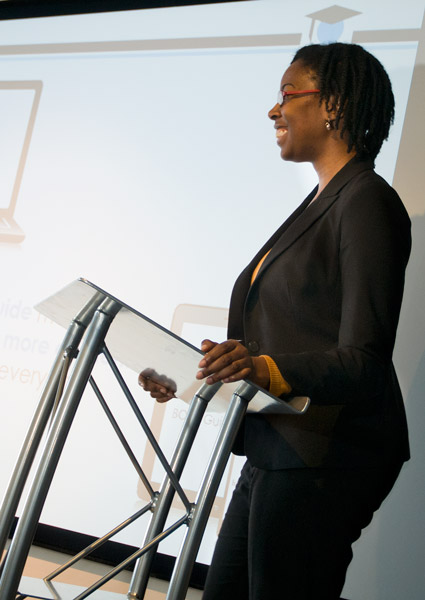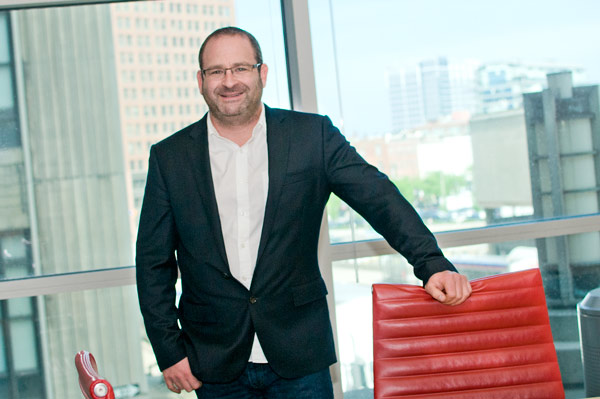stack the deck: tips from the pros on what makes a great sales pitch
When she’s not busy building her business, BOLD Guidance, an app that helps students navigate the college application process, Nichelle McCall is selling her business. McCall, who's lost count of how many pitches she’s given, says it always comes down to telling a story.
"You want to clearly and concisely go over the high-level points: what is it you do, the pain point you’re going to solve, how many people you’re able to serve and how much money you are able to make," she says. "Then, you gain interest and they want to find out more."
Thanks to a bevy of new accelerators and incubators -- all grooming startups to be the Next Big Thing – the art of the pitch is more important now than ever. Whether it’s a casual elevator pitch or an intense 20-minute address to potential investors, there are some definite dos and don’ts to giving an effective pitch.
Here, we talk to some experts on both sides of the podium for some advice on giving the perfect pitch.
Be Confident, Be Passionate
Confidence is key when getting up in front of a crowd to sell your idea, says Reka Barabas, director of Bad Girl Ventures Cleveland. "Confidence is super important because when you talk about your own business, people are investing in you as much as they’re investing in the company," she says.
Doug Hardman, founder of SparkBase, a mobile loyalty rewards program provider, advises pitchers to focus on selling themselves and the business will follow. "Be prepared and be confident," he says. "You’re up there to pitch your company, but they’re looking at you. The company is almost secondary. The saying goes ‘They’re investing in the jockey, not the horse.’ If the idea is solid and the entrepreneur is at all suspect, you’ll never get to a second meeting."
"Be passionate about your cause," says Dan Mansoor of GiveNext, a mobile app to make charitable giving easy. "You are an evangelist, whether it’s a nonprofit or a for-profit business. When you are passionate about what you’re doing, it gets rid of the nerves."
Prepare but Don't Memorize
The last thing the audience wants to hear is an over-rehearsed, memorized speech, says Bad Girl's Barabas. "Every word has to be there for a reason," she says. "Practicing and being prepared is important, but don’t memorize it; you can tell. Memorize the first two or three sentences so you’re confident and have a good start."
Practice, practice and then practice some more, says McCall. "I feel like my pitch has continued to change over time," she says. "I’m constantly getting feedback from people by giving the pitch and asking them to give it back to me. If they can’t explain it, it means I didn’t explain it well."
Be a Bean Counter
Entrepreneurs should understand the bottom line, says Hardman. "Know your numbers -- dead to rights, inside out," he says. "Ever watch Shark Tank? The people that get slaughtered don’t know their numbers. If you don’t know something, just say that you aren’t 100-percent sure and don’t want to give misinformation. But make sure you get the answer fast."
Morris Wheeler, founder and president of Drummond Road Capital, has sat through hundreds of pitches and done thousands of deals. When he hears a pitch, he's interested in the basics. "The bottom line is: The pitch is important but if you are a professional investor, the pitch is far less important than just understanding who the founders are and what the company is about," Wheeler explains.
Know Your Audience
Pitch audiences vary and entrepreneurs need to know to whom they are pitching. "One pitch is not for all," says GLIDE co-director Dennis Cocco. "Entrepreneurs need to clearly understand who their audience is and what the audience is looking for."
George Buzzy, an investor and JumpStart’s entrepreneur-in-residence, cautions pitchers to know the difference between a pitch night and pitching to investors. "They are very different pitches," he says. "One of the things I’ve noticed is those entrepreneurs who come out of one accelerator or another use the same pitch they used in the accelerator when they’re asking investors for money. People have failed because they gave the wrong pitch."
Bizdom’s Paul Allen agrees. "It’s not easy being a founder because you get a lot of conflicting information on what to share," he says. "In an elevator pitch you want to say what you do, why it’s important and, ideally, communicate how you’d make money."
The investor pitch goes into much more detail. "In a longer pitch you want to explain what it is you do and be very clear about that," says Allen. "Entrepreneurs often struggle with that, because to them, it’s very clear what they do."
To find out who your audience is and what they are looking for, simply ask, says FlashStarts founder Charles Stack. "If it’s a VC firm, ask ahead of time what criteria they use," Stack recommends. "If it’s an accelerator, ask what deals they are looking for and who they’ve accepted in the past."
In preparation for the 2013 COSE pitch competition, which Mansoor won last fall, he studied the profiles of the four judges and found out what charities, nonprofits and colleges they were involved with. "It makes it a little more personal," he says. "I will email the coordinators of the pitch and ask who is going to be in the audience and if they know the product or industry."
Don't Presume Knowledge
Stack says that presenters often start too deep and assume that the audience knows more than it does. "Don’t assume too much," he says. "You still need to get grounded as an audience. The audience needs context. It may be one word or sentence or a single slide that puts your space in the universe at large."
Often, it’s as simple as showing the audience the product. "If you’re pitching me and have the product, we can save a lot of time if you just show me the product," says Stack. "I can get quickly grounded and get on to information that is valuable to me if you just show me the product."
Include an Exit Strategy or Not?
Some experts say including an exit strategy in a pitch is a must. Others say, don’t get ahead of yourself. Stack, for instance, doesn’t want to hear it. "I really dislike presentations that focus on the exit," he says. "Focus on solving the problem. I also don’t care for five-year projections. They just emphasize made up numbers. No one knows where you’ll be in five years."
On the other hand, Buzzy wants to hear long-term plans and goals. "Angels aren’t interested in investing in a company for 30 years," he argues. "They want to sell or go public. Tell the audience, ‘If I execute my plan, I think I will be irresistible to these three or four players.’ You may not do any of those things, but at least you’ve given it some thought."
Wheeler also wants to know what the plan is. "If I don’t see a company being huge, it goes in a very different bucket for me," he says. "I want to know who they’re going to sell the company to and how they’re going to exit. I want to know that you are confident enough and passionate enough that you’re going to build it into the next Facebook."
Pitfalls to Avoid
It might sound obvious, but make sure the audience knows what your company or product actually does. "Ten percent of the pitches I’ve seen, at the end of three to 10 minutes, I don’t know what they do," says Stack. "That’s a bomb."
Avoid being too gimmicky, advises Allen. "A lot of entrepreneurs fall into the trap of showmanship or trying to do something cute," he says. "That might appeal to some investors, but I don’t think the majority of investors like it when you’re dealing with people’s money."
Buzzy says he's turned off by overly confident pitchers. "The ones that are bombs are the entrepreneurs who are know-it-alls and condescending," he says. "They interrupt when questions are asked or don’t appear very approachable."
Hardman says he vividly remembers his biggest bomb. It was at an early stage of SparkBase, but was painful nonetheless. "I found the [slide] deck a few months ago and was embarrassed by how many slides and how many words," he says. "I was so eager to tell them everything about the business that I lost sight of the reason for the meeting. I chewed up the entire hour with 'Death by PowerPoint.' Ugh."








